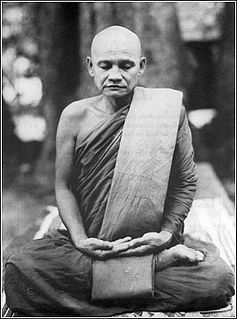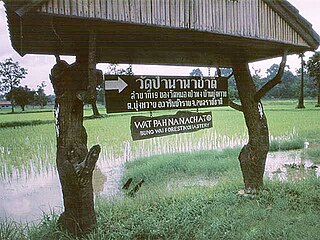
Chah Subhaddo also known by his honorific name "Phra Bodhiñāṇathera" was a Thai Buddhist monk. He was an influential teacher of the Buddhadhamma and a founder of two major monasteries in the Thai Forest Tradition.

Abhayagiri is a Theravadin Buddhist monastery of the Thai Forest Tradition in Redwood Valley, California. Its chief priorities are the teaching of Buddhist ethics, together with traditional concentration and insight meditation, as an effective way of completely uprooting suffering and discontent. Abhayagiri means 'fearless mountain' in the Pali language.

Luang Por Sumedho or Ajahn Sumedho is one of the senior Western representatives of the Thai forest tradition of Theravada Buddhism. He was abbot of Amaravati Buddhist Monastery, UK, from its consecration in 1984 until his retirement in 2010. Luang Por means Venerable Father (หลวงพ่อ), an honorific and term of affection in keeping with Thai custom; ajahn means teacher. A bhikkhu since 1967, Sumedho is considered a seminal figure in the transmission of the Buddha's teachings to the West.
Santacittarama is the name of the Italian Theravada Buddhist monastery in the Thai Forest Tradition lineage of Ajahn Chah located near Rome. In the spring of 1990 the Italian Bhikkhu Ajahn Thanavaro and then Anagarika John Angelori were sent by Ajahn Sumedho to take up residence in a small house outside the village of Sezze-Romano south of Rome. Later, with an important contribution from the Thai community, a more suitable location was found in Poggio Nativo in the countryside of Sabina. and a larger monastery was established in 1997 with separate buildings for visitors and Kutis in the woods for residents and visiting Bhikkhus. Mrs. Natchari Thananan, the wife of the Thai Ambassador to Italy, Anurak Thananan, was instrumental in raising funds for this monastery. Some years later the Santacittarama Association acquired an adjoining property, with a building used mainly to accommodate elderly monks (Nirodha), and a large Temple was constructed.

Ajahn Amaro is a Theravāda Buddhist monk and teacher, and abbot of the Amaravati Buddhist Monastery at the eastern end of the Chiltern Hills in South East England. The centre, in practice as much for ordinary people as for monastics, is inspired by the Thai Forest Tradition and the teachings of the late Ajahn Chah. Its chief priorities are the practice and teaching of Buddhist ethics, together with traditional concentration and insight meditation techniques, as an effective way of dissolving suffering.

Ajahn Candasiri is one of the Theravāda Buddhist monastics who co-founded Chithurst Buddhist Monastery in West Sussex, England, a branch monastery of the Ajahn Chah lineage. She is currently ordained as a ten-precept sīladhārā, the highest level that is allowed for women in the Thai Forest Tradition. She is one of the senior monastics in western Theravāda Buddhism and trained alongside women who later became fully ordained bhikkhunis and abbesses of monasteries.

Ajahn Sundara is a French-born Buddhist sīladhārā in the tradition established by Ajahn Sumedho.
The Sīladharā Order is a Theravada Buddhist female monastic order established by Ajahn Sumedho at Chithurst Buddhist Monastery, England. Its members are known as Sīladharās.
Bodhinyana is a Theravadin Buddhist monastery in the Thai Forest Tradition located in Serpentine, about 60 minutes' drive south-east of Perth, Australia.

Cittaviveka, commonly known as Chithurst Buddhist Monastery, is an English Theravada Buddhist Monastery in the Thai Forest Tradition. It is situated in West Sussex, England in the hamlet of Chithurst between Midhurst and Petersfield. It was established in 1979 in accordance with the aims of the English Sangha Trust, a charity founded in 1956 to support the ordination and training of Buddhist monks (bhikkhus) in the West. The current abbot, since 2019, is Ajahn Ahimsako.
Buddhism is quite a recent religion to arrive in England. Despite this, 238,626 people in England declared themselves to be Buddhist at the 2011 Census and 34% of them lived in London.

Wat Pah Nanachat is a Thai Theravada Buddhist monastery in northeast Thailand about 15 kilometres from the city of Ubon Rachathani. It was established in 1975 by Ajahn Chah as a training community for non-Thais according to the norms of the Thai Forest Tradition. Resident monks, novices and postulants include a wide range of nationalities. The primary language of communication and instruction is English.

Wat Nong Pah Pong is a Theravada Buddhist monastery in Ubon Ratchathani Province, (Amphoe) Warin Chamrap, Thailand. It was established by the late Ajahn Chah as the main monastery of the Thai Forest Tradition.

Aruna Ratanagiri Buddhist Monastery is a Theravada Buddhist monastery of the Thai Forest Tradition in Northumberland, England. The community consists of monks, novices and postulants from a wide range of nationalities, usually numbering around eight Sangha members. The monastery includes an adjacent lay retreat facility known as Kusala House.

Birken Forest Buddhist Monastery, or Sītavana, is a Theravada Buddhist monastery in the Thai Forest Tradition near Kamloops, British Columbia. It serves as a training centre for monastics and also a retreat facility for laypeople. Its abbot is Venerable Ajahn Soṇa.

Ajahn Sucitto is a British-born Theravada Buddhist monk. He was, between 1992 and 2014, the abbot of Cittaviveka, Chithurst Buddhist Monastery. Sucitto was born in London and ordained in Thailand in March 1976. He returned to Britain in 1978 and took up training under Ajahn Sumedho at the Hampstead Buddhist Vihara. In 1979 he was one of the small group of monks, led by Ajahn Sumedho, who established Cittaviveka, Chithurst Buddhist Monastery, in West Sussex. In 1981 he was sent up to Northumberland to set up a small monastery in Harnham, which subsequently became Aruna Ratanagiri. In 1984 he accompanied Ajahn Sumedho in establishing Amaravati Buddhist Monastery in Hertfordshire. In 1992 he was appointed abbot of Cittaviveka. On October 26, 2014, he resigned the post, but intends to continue teaching as before.

Ajahn Pasanno is the most senior Western disciple of Ven. Ajahn Chah in the United States, and most senior in the world after Ajahn Sumedho and Ajahn Khemadhammo. For many years he was the abbot of Wat Pah Nanachat International Forest Monastery in Northeast Thailand. In the late 1990s, Ajahn Pasanno moved to California to head the new Abhayagiri Monastery. With more than 40 years as a bhikkhu, Ajahn Pasanno has been instrumental in training many monks in Thailand and the United States and has been supportive of training for women.

The Forest Tradition of Ajahn Chah is a Mahanikai monastic organization in the Thai Forest Tradition composed of the students of Ajahn Chah Subhaddo. Strictly speaking, the Forest Tradition of Ajahn Chah denotes the institutions who have a branch affiliation with Wat Pah Pong, the administrative center of the organization.

Ajahn Viradhammo or Luang Por Viradhammo is a Canadian monk in the Thai forest tradition of Theravada Buddhism. He was ordained as a monk in 1974 by Ajahn Chah at Wat Nong Pah Pong monastery and became one of the first residents at Wat Pah Nanachat, the international monastery in north-east Thailand. Luang Por Viradhammo is the most senior Thai Forest monk in Canada and currently the Abbot of Tisarana Buddhist Monastery in Perth, Ontario. Luang Por means Venerable Father (หลวงพ่อ), an honorific and term of affection in keeping with Thai custom; ajahn means teacher.

Ajahn Jayasāro is a British-Thai Buddhist monk in the Forest Tradition of Ajahn Chah.





















